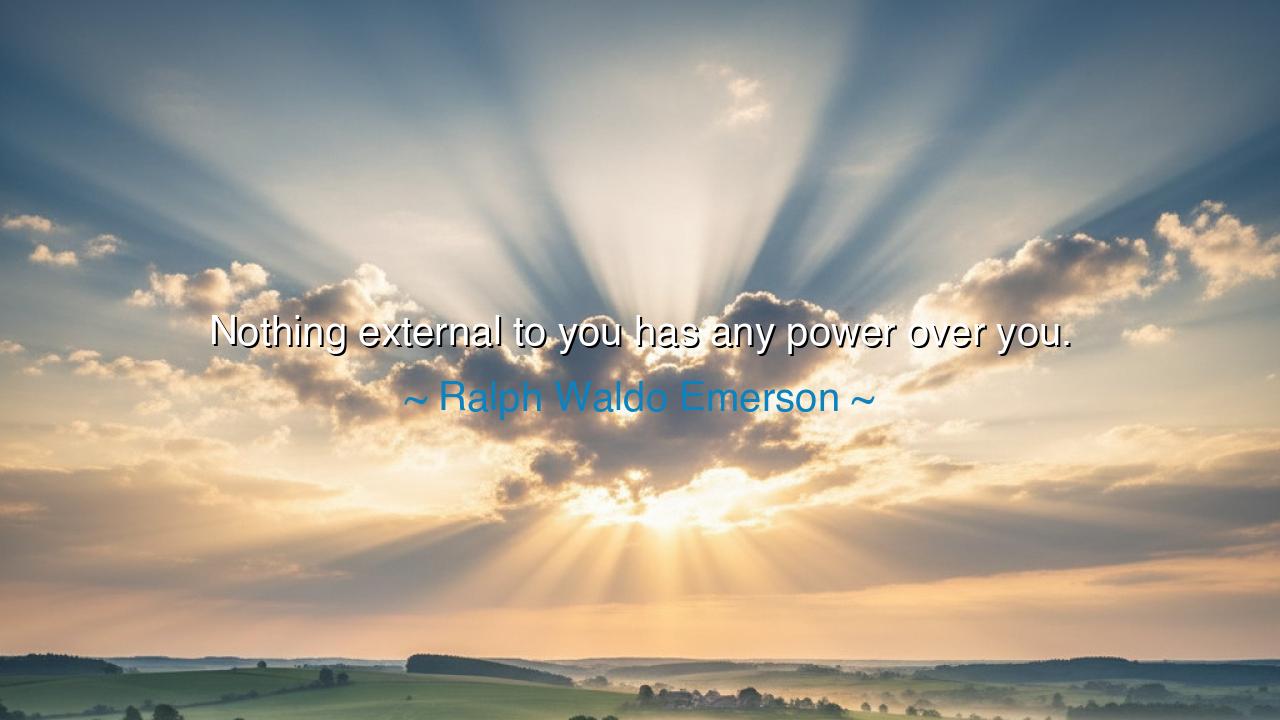
Nothing external to you has any power over you.






Ralph Waldo Emerson, the great philosopher and poet of the American transcendental movement, declared with quiet yet unwavering conviction: “Nothing external to you has any power over you.” In these words, he touches upon a truth as old as time itself—the idea that the true strength of the individual lies not in what happens to them, but in their response to what happens. The external world, with all its forces, challenges, and distractions, has no true power unless we give it dominion over our hearts and minds. The power of the soul is found not in the sway of fortune, but in the sovereignty of the spirit.
The meaning is profound and deeply empowering. We are often taught that our happiness, our success, and our peace are shaped by the forces outside us—the circumstances we face, the people around us, the events of the world. But Emerson calls us to recognize that these are illusions of control. Nothing external, whether it be the opinions of others, the changing tides of fortune, or the sufferings we endure, can truly hold sway over our inner peace unless we allow it. True power resides in our own consciousness, in our ability to choose our response and maintain our integrity in the face of life’s trials.
History bears witness to this truth in the lives of great men and women who, despite facing overwhelming external circumstances, maintained their inner power. Consider Nelson Mandela, who endured years of imprisonment, yet never allowed his captors or the system that sought to break him to define his spirit. Through it all, he maintained a vision of freedom, and by doing so, he transcended the oppression around him. Mandela’s story stands as a beacon of Emerson's wisdom—that the external world may shape our circumstances, but it cannot define our essence unless we permit it.
This principle also finds resonance in the teachings of Stoic philosophers like Marcus Aurelius and Epictetus, who insisted that our true power lies in our ability to control our reactions to the world. Epictetus, himself a former slave, wrote: "We cannot choose our external circumstances, but we can always choose how we respond to them." Like Emerson, these philosophers understood that while we cannot control what happens to us, we can always control how we meet life’s challenges. Inner strength, they taught, comes from the recognition that we are not victims of the world, but masters of our own spirit.
Thus, let the seeker of wisdom remember: the true source of power lies not in the world around us, but in the depth of our own minds and hearts. Nothing external can touch the essence of who we are unless we allow it. Suffering, failure, and opposition may challenge us, but they do not have the final say—our response to these forces shapes the course of our lives. Emerson’s words are a call to sovereignty, to mastery over the self, and to a life of inner freedom, unshaken by the winds of fortune.






TAHuynh Trong An
I find myself questioning the limits of this philosophy. Can it coexist with the reality that social, political, or environmental forces can significantly constrain what we can do? Perhaps the statement is not about denying external influence entirely but about reclaiming mental sovereignty—recognizing that while we may not control everything that happens, we can control our response. How can one cultivate this mindset without falling into denial of real-world challenges?
DNDayy Ngoc
This perspective makes me think about accountability and autonomy. If no external force can control me, then responsibility for my choices lies entirely within me. That’s liberating, but also intimidating. Could this mindset inadvertently foster self-blame in situations where external factors clearly limit options? I’m curious whether Emerson’s view is more about spiritual or moral self-governance than a literal assertion about daily life circumstances.
UGUser Google
I feel intrigued and slightly unsettled by this. If I accept that external things hold no power, does that risk underestimating the influence of other people or societal systems? On the other hand, it offers a radical form of empowerment: by changing my perceptions, I can neutralize fear, anger, or anxiety. I wonder how one can practically train oneself to internalize this perspective consistently, especially in high-pressure or emotionally charged situations.
VVii
This makes me reflect on emotional responsibility. If external events have no power, then anger, jealousy, or fear must originate entirely from within. Does that mean people who are constantly reactive are simply choosing their reactions poorly, or is it more complex than that? I’m curious whether this idea aligns with modern psychological approaches like cognitive-behavioral therapy, which emphasizes that our interpretations shape emotional responses, suggesting Emerson might have been ahead of his time.
TMXuan Thuy Mai
I find this idea inspiring but also somewhat idealistic. External circumstances—like economic hardship, systemic inequality, or health crises—can profoundly influence our lives. Can Emerson’s notion be reconciled with these realities, or is it more about the mindset with which we approach challenges? I wonder whether true freedom from external influence is achievable for everyone, or if it is primarily a philosophical lens to help us regain some sense of personal agency.